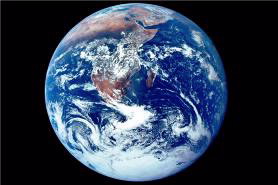EMBARGOED FOR RELEASE | April 08, 2013
Population boom poses interconnected challenges of energy, food, water
Note to journalists: Please report that this research was presented at a meeting of the American Chemical Society.
NEW ORLEANS, April 8, 2013 — Mention great challenges in feeding a soaring world population, and thoughts turn to providing a bare subsistence diet for poverty-stricken people in developing countries. But an expert speaking here today at the 245th National Meeting & Exposition of the American Chemical Society, the world’s largest scientific society, described a parallel and often-overlooked challenge.
“The global population will rise from 7 billion today to almost 9 billion people by 2040,” Ganesh Kishore, Ph.D., said at the meeting, which continues through Thursday. “Providing enough food to prevent starvation and famine certainly will be a daunting problem. But we also have to meet the rising expectations of huge numbers of people who will be moving up into the middle class. We will have a New York City-sized population added to the middle class every second month. Their purchasing power is projected to be more than $60 trillion by 2040. Most of this growth will be in Asia. The expanding middle class will demand food that doesn’t just fill the belly, but food that’s appetizing, safe and nourishing, convenient to prepare and available in unlimited quantities at reasonable prices. Producing food for a middle class that will number more than 5 billion within 30 years will strain existing technology for clean water, sustainable energy and other resources.”
Media Contact
During April 5-10 the contacts can be reached at 504-670-4707.
Michael Bernstein
202-872-6042
m_bernstein@acs.org
Michael Woods
202-872-6293
m_woods@acs.org
Kishore spoke at a symposium, “The Interconnected World of Energy, Food and Water,” that focused on approaches to prepare for the population boom. Kishore is a co-organizer of the symposium, along with John Finley, Ph.D., of Louisiana State University and Hessy Taft, Ph.D., of St. John’s University.
“We want to foster greater awareness among scientists, the public and policy-makers about the interconnections between these three challenges,” said Kishore. “Water, food and energy must be understood together — it’s not just one or the other, so we have speakers addressing all of these topics. And the reason for this interconnection is that we need water to produce both energy and food — whether it is about harvesting fossil-fuel energy, producing biobased renewable energy or producing food, we need fresh water! In addition, we are competing with other demands for fresh water. It is not just about developing technology — we have to move the technology from the bench to the real world so that solutions see the light of day, which the industry speakers in the session can address. Regulatory policies have to keep pace with technology development, not just in places where the technology is developed but where the technology is deployed, and that requires science-based risk assessment capability and the creation of consumer confidence in the process.”
He described how the addition of one billion people every 12-13 years itself poses challenges that require innovations, rather than simply scaling up existing technologies. And he said that opportunities go hand-in-hand with the challenges.
They include using plant biotechnology and tools of synthetic biology to expand the food supply and providing new sources of energy, developing more efficient ways to convert sunlight into chemical energy and applying information technology to the production of food and chemical energy more efficiently. Kishore cited specific examples of progress being made in those areas. As CEO of the Malaysian Life Sciences Capital Fund, Kishore and colleagues are promoting some of these strategies by investing in companies working in these areas. One company in which they invest, for instance, improves agricultural crops by enhancing plant breeding and genetic technologies. Another is developing ways to transform waste gases into fuels.
To automatically receive news releases from the American Chemical Society contact newsroom@acs.org.
###

issues for a burgeoning middle class.

